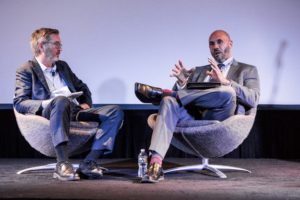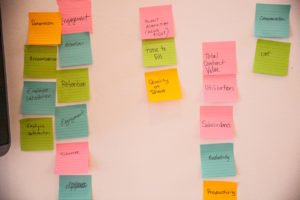How a Social Scientist Measures Kindness in Life and Diversity on Screen


“Why now, for kindness?”
The question stems from buzz around the recent launch of UCLA’s Bedari Kindness Institute, which will conduct scientific research on kindness and its outcomes among members of society.
“We live in very polarized times, and we have lots of questions plaguing us about how we treat our fellow human beings,” explained Prof. Darnell Hunt, dean of social sciences at UCLA and head of the department overseeing the new institute.
“There are issues with immigration and what’s been happening at the border, and with women and how they’re treated in society,” Hunt told the audience at From Day One’s conference in Los Angeles. “These are long-standing issues, but we’ve reached the point where these things are critical in terms of importance and we need to look at them in structured, measured ways.”
But if kindness can be better understood, is it a quality that can be promoted? Maybe so. Hunt shared thoughts on what he described as “contagious pro-sociality,” a theory studied by Daniel Fessler, an evolutionary anthropologist and inaugural director of the Kindness Institute.
“[Fessler] does a number of experiments to understand the conditions under which people are kind to one another,” Hunt explained. “Under certain circumstances, when you see someone engaged in a random act of kindness, others will copy that behavior.”

Hunt pointed out that kindness often creates a domino effect and gives individuals the sense of participating in something greater than themselves. On the other hand, he mentioned that harmful behavior can also be copied in environments where people are given permission to do so.
“If it becomes common to treat people as less than human, that opens the door for them to carry out acts they wouldn’t have before,” he explained. “We’re studying the conditions where it’s more or less likely for these things to happen and make recommendations about policies that will encourage pro-sociality as opposed to negative treatment.”
Along with scientific research, Hunt said that the goal of the Bedari Kindness Institute is to collect findings and share them in terms that the general public will understand. After conducting its research, he said the institute’s internal team will work with policymakers to develop guidelines that will ideally create more humane societies.
A related question, said Hunt, is why members of society may lack incentive toward being kind to one another. One example he gave focused on genocide and specifically, how seemingly “good” people participate in harmful acts.
“I have a colleague in sociology who studies the Holocaust,” he shared. “She found that certain authority figures give people cover to do things they otherwise might not do. If someone in a position of authority says it’s okay to do [bad] things, you’re much more likely to do it.”
He said cultural norms shape the way we interpret any situation. Especially in business and politics, ruthless or competitive behavior is often rewarded more than consideration of one’s counterparts.
The conversation segued into Hunt’s work on the annual Hollywood Diversity Report (HDR), based on a study he has conducted for seven years, which tracks diversity trends in television and film. He described how his studies on diversity in Hollywood began, and the initial task of convincing major decision makers that more diversity would have a positive impact on the bottom line.
“Bringing the two conversations together [of social impact and making money], the report was able to show that diversity does sell and it’s okay to be inclusive,” Hunt said. “In fact, if you’re inclusive, you stand to make more money.”
Before his report arrived on the scene, the nature of Hollywood was less than welcoming to individuals who did not fit the traditional image of what would sell in television and film. However, the findings of the first HDR, Hunt said, encouraged kinder and more inclusive work environments for women and people of color, among other marginalized groups. While major strides have been made since the first annual report, Hunt admitted there is a long way to go.

He said diversity is now driving the market, whereas it used to be an afterthought. However, there is still a disconnect between what Hollywood looks like onscreen and off-screen. Hunt offered some final thoughts on what needs to be done to bridge the gap and make continuous progress toward true inclusivity.
“If you want to remain profitable, you need to tell stories that resonate with where your audience today and where the audience is going,” Hunt said.
He added: “That means not only putting [diverse] people in front of the camera, but behind the camera, in the writer’s room, directing, and in the executive suites.”
Quinisha Jackson-Wright is a journalist who has contributed to the New York Times, Business Insider, and The Muse. She is a U.S. Navy veteran and graduate of the University of Missouri-St. Louis
The From Day One Newsletter is a monthly roundup of articles, features, and editorials on innovative ways for companies to forge stronger relationships with their employees, customers, and communities.